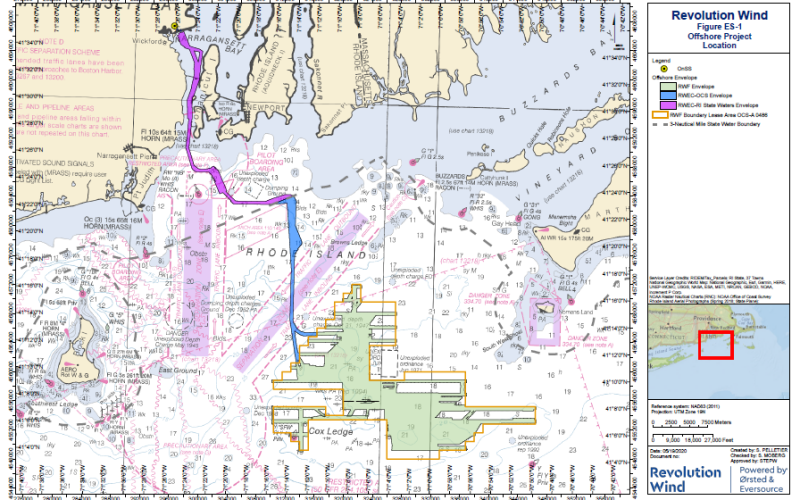A Rhode Island-based environmental group asked a federal court to freeze work on the Revolution Wind project, saying the plans require a new biological opinion on potential effects on endangered sei and fin whales.
Green Oceans filed its original lawsuit in January challenging the southern New England offshore wind project. On April 18 the group’s lawyers were back at U.S. District Court Judge Royce C. Lamberth’s court in Washington, D.C., with a motion to stay all permits and approvals for the project.
The activists say they made their move because the federal Bureau of Ocean Energy Management and NOAA Fisheries’ Office of Protected Resources reinitiated a required consultation under the Endangered Species Act.
Originally issued by NOAA in July 2023, the ESA process was restarted because of
“insufficient protections for the endangered sei and fin whales and for two species of endangered turtles,” Green Oceans said in a statement. “The Biological Opinion, a required element for the approval and construction of any offshore wind project, is a comprehensive assessment of the anticipated impacts on marine animals during the life of the project, from construction to decommissioning.”
Lisa Quattrocki Knight, president and co-founder of Green Oceans, said questions about endangered species go to the heart of their original court complaint.
“The inadequacy of the first Biological Opinion highlights the failure of the government to obey environmental regulations in the rush to permit the Revolution Wind project,” said Quattrocki Knight in the group’s statement. “Furthermore, the fact that a new Biological Opinion is required reinforces the primary allegation of our case – the government dropped the ball and did not comply with the Endangered Species Act when it approved the project.”
“Existing environmental protections require that the developer must not undertake any construction activity or alter any critical habitat until the new Biological Opinion is in place. Yet, the Bureau of Ocean Energy Management is continuing to allow the developer to relocate boulders and dump scour protection on Coxes Ledge without a valid permit in place,” said Knight.
NOAA Fisheries declined to comment on the Green Oceans motion. Through a spokeswoman the agency confirmed that BOEM and the NOAA Fisheries Office of Protected Resources requested a reinitiation of the Endangered Species Act consultation that had been completed for the Revolution Wind project in July 2023.
After the revised consultation is complete a new Biological Opinion will be issued to BOEM and other agencies.
Along with the recently completed South Fork Wind, Revolution Wind raised objections overs the Cox Ledge siting, considered critical fish habitat particularly for Atlantic cod spawning.
BOEM, NOAA Fisheries and fishermen have long debated how to protect cod habitat in the region if turbine arrays are built, with NOAA experts specifically pointing to likely impacts around Cox Ledge.
The often-bitter debate was one factor in the Sept. 1 mass resignation of the Rhode Island Fishermen’s Advisory Board, whose members charged the state Coastal Resource Management Council is too deferential to wind development interests at the expense of habitat and fisheries impacts.
A block of ocean off southern New England between Nantucket and Block Island – including tens of thousands of acres marked for offshore wind energy development – was designated a ‘habitat area of particular concern’ by NOAA March 6. The action reflected the debate over Cox Ledge and a proposal by the New England Fishery Management Council over wider concerns of how wind development will affect essential fish habitat.
The designation itself does not impose new conditions on BOEM and wind developer plans for energy projects. The HAPC brings additional conservation focus when NOAA Fisheries reviews and comments on federal and/or state actions that could impact essential fish habitat – such as BOEM’s reviews of offshore wind energy construction and operations plans.




